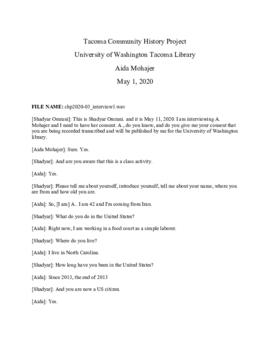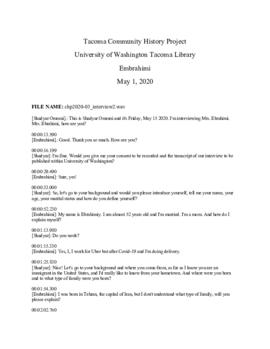Identity elements
Reference code
Name and location of repository
Level of description
File
Title
Pandemic in Her Baby Sling: The Iranian American Women's Story of Migration Traumas and Labor Hardship During 2020's COVID-19 Pandemic
Date(s)
- 2020 (Creation)
Extent
Content and structure elements
Scope and content
Oral history interviews with Aida Mohajer and Ebrahimi by Shadyar Omrani conducted 05/01/2020. Since COVID-19 started to become a global pandemic, it has caused personal and public traumas. Increase in unemployment rate, bankruptcy of small businesses, financial stress to the middle and working-class and the closure of many businesses which relied on peopleΓÇÖs social activities, including the gig industry, tourism industry and restaurants, are additional traumas to the issues of health and life threats people face by the contingency of the virus. By the end of May 2020, more than 2 million Americans were confirmed COVID-19 positive, 113 thousand of whom could not survive. Amongst the most affected populations, the people of color, especially Black Americans and immigrants have been suffering most. This research focuses on immigrant working women from the Middle East, whose life journeys are filled in with several traumas, some intensified during the pandemic. This paper provides two oral history records of two Iranian American working mothers, Aida Mohajer and Mrs. Ebrahimi, who carry historical traumas experienced in two different countries with two different cultures, i.e. Iran, and the USA. The intervieweesΓÇÖ stories show how the experience of trauma is related to the social class and what imposed social factors beyond choice can determine the class and different approaches to traumas.
System of arrangement
Conditions of access and use elements
Conditions governing access
Technical access
Conditions governing reproduction
Individuals may use project materials for scholarly or research purposes, according to the provisions of fair use, but reproducing, publishing, or broadcasting any oral history project materials requires permission. No use beyond limited quotation for educational and research purposes should be made of these interviews and other materials without obtaining written permission. For more information, contact the University of Washington Tacoma Library.
Languages of the material
Scripts of the material
Language and script notes
Finding aids
Acquisition and appraisal elements
Custodial history
Immediate source of acquisition
Appraisal, destruction and scheduling information
Accruals
Existence and location of originals
This oral history is a part of the University of Washington Tacoma Community History Project. To access additional content related to this interview, see the UWT Digital Collections.


